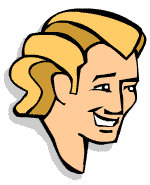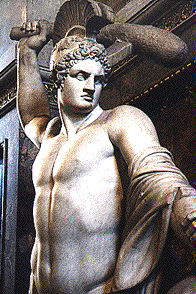

It was by lifting a boulder that Theseus, grandson of the king of Troezen, first proved himself a hero. Theseus was sixteen at the time. He had been raised by his grandfather and his mother, Princess Aethra. One day the princess called Theseus to her side. It was time, she said, that he learned of his father, who was the ruler of a mighty kingdom. This was news to Theseus, who had been under the impression that his father was one of the gods. "Before I divulge his identity," said the princess, "you must meet the challenge your father has set you." Years ago, the king had hefted a mighty stone. Underneath he had placed something for his son to find if he could lift the weightAethra guided Theseus to a forest clearing, in the midst of which was a boulder. Theseus proceeded to lift the stone easily, or so the myth is often told. But Theseus would have had trouble with a task involving brute strength. This may be deduced from the tradition that he invented "scientific" wrestling, the discipline by which even a lightweight can beat a stronger adversary by fancy footwork
.
trick holds and using the opponent's momentum to advantage. Theseus would have had little cause to invent such tactics if he'd been capable of beating his adversaries by sheer physical strength. So when it came to lifting boulders, he was at a disadvantage. Resourcefulness, another heroic trait, must have come to his aid. He would have looked about for some means to multiply his physical strengthBeneath the stone Theseus found certain tokens left by his father. His name, Aethra now revealed, was King Aegeus of Athens. Prompted by a sense of heroic destiny, Theseus set out forthwith to meet this parent he had never known. He determined to journey to Athens by land, although his mother argued for the safer route by sea. And in fact the landward route proved to be infested by an unusual number of villains, thugs and thieves. Theseus quickly adopted the credo of doing unto these bad guys what they were in the habit of doing to others
.
The next malefactor who received a dose of his own medicine was a fellow named Sinis, who used to ask passers-by to help him bend two pine trees to the ground. Why the wayfarers should have wanted to help in this activity is not disclosed. Presumably Sinis was persuasive. Once he had bent the trees, he tied his helper's wrists - one to each tree. Then he took a break. When the strain became too much, the victim had to let go, which caused the trees to snap upright and scatter portions of anatomy in all directions. Theseus turned the tables on Sinis by tying his wrists to a couple of bent pines, then letting nature and fatigue take their courseThen, not far from Athens, Theseus encountered Sciron. This famous brigand operated along the tall cliffs which to this day are named after him. He had a special tub in which he made each passing stranger wash his feet. While they were engaged in this sanitary activity, Sciron kicked them over a cliff into the ocean below, where they were devoured by a man-eating turtle. Theseus turned the tables on Sciron, just as he had turned them on Pine-Bender
.